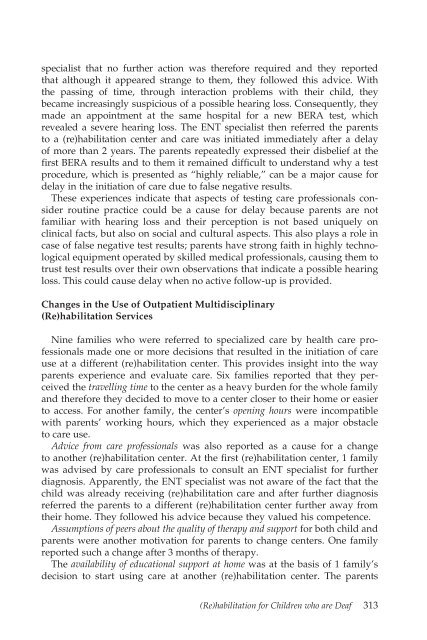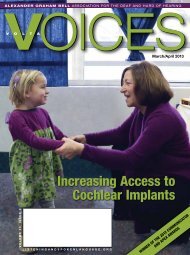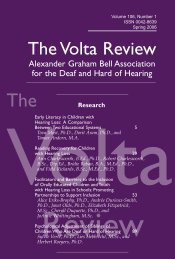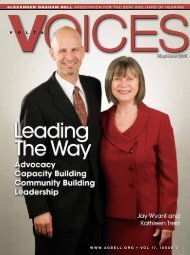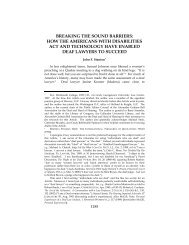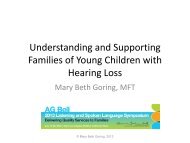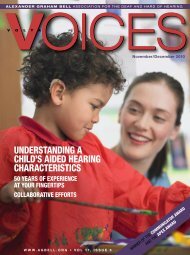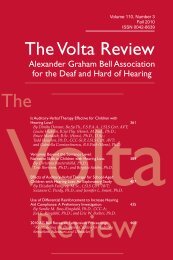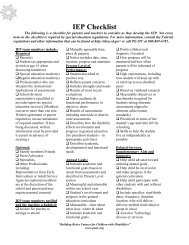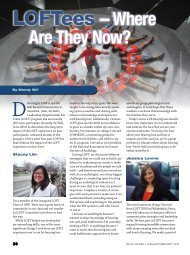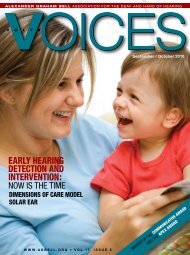The Volta Review - Alexander Graham Bell Association
The Volta Review - Alexander Graham Bell Association
The Volta Review - Alexander Graham Bell Association
Create successful ePaper yourself
Turn your PDF publications into a flip-book with our unique Google optimized e-Paper software.
specialist that no further action was therefore required and they reported<br />
that although it appeared strange to them, they followed this advice. With<br />
the passing of time, through interaction problems with their child, they<br />
became increasingly suspicious of a possible hearing loss. Consequently, they<br />
made an appointment at the same hospital for a new BERA test, which<br />
revealed a severe hearing loss. <strong>The</strong> ENT specialist then referred the parents<br />
to a (re)habilitation center and care was initiated immediately after a delay<br />
of more than 2 years. <strong>The</strong> parents repeatedly expressed their disbelief at the<br />
first BERA results and to them it remained difficult to understand why a test<br />
procedure, which is presented as “highly reliable,” can be a major cause for<br />
delay in the initiation of care due to false negative results.<br />
<strong>The</strong>se experiences indicate that aspects of testing care professionals consider<br />
routine practice could be a cause for delay because parents are not<br />
familiar with hearing loss and their perception is not based uniquely on<br />
clinical facts, but also on social and cultural aspects. This also plays a role in<br />
case of false negative test results; parents have strong faith in highly technological<br />
equipment operated by skilled medical professionals, causing them to<br />
trust test results over their own observations that indicate a possible hearing<br />
loss. This could cause delay when no active follow-up is provided.<br />
Changes in the Use of Outpatient Multidisciplinary<br />
(Re)habilitation Services<br />
Nine families who were referred to specialized care by health care professionals<br />
made one or more decisions that resulted in the initiation of care<br />
use at a different (re)habilitation center. This provides insight into the way<br />
parents experience and evaluate care. Six families reported that they perceived<br />
the travelling time to the center as a heavy burden for the whole family<br />
and therefore they decided to move to a center closer to their home or easier<br />
to access. For another family, the center’s opening hours were incompatible<br />
with parents’ working hours, which they experienced as a major obstacle<br />
to care use.<br />
Advice from care professionals was also reported as a cause for a change<br />
to another (re)habilitation center. At the first (re)habilitation center, 1 family<br />
was advised by care professionals to consult an ENT specialist for further<br />
diagnosis. Apparently, the ENT specialist was not aware of the fact that the<br />
child was already receiving (re)habilitation care and after further diagnosis<br />
referred the parents to a different (re)habilitation center further away from<br />
their home. <strong>The</strong>y followed his advice because they valued his competence.<br />
Assumptions of peers about the quality of therapy and support for both child and<br />
parents were another motivation for parents to change centers. One family<br />
reported such a change after 3 months of therapy.<br />
<strong>The</strong> availability of educational support at home was at the basis of 1 family’s<br />
decision to start using care at another (re)habilitation center. <strong>The</strong> parents<br />
(Re)habilitation for Children who are Deaf 313


